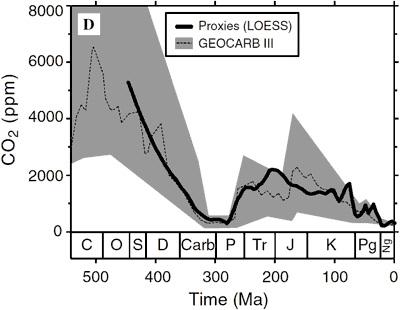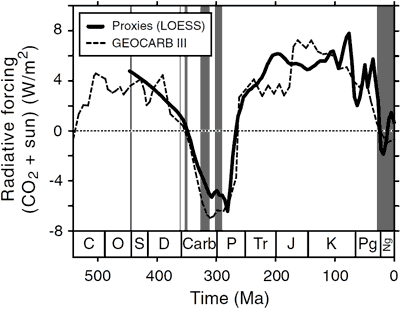CO2 has been higher in the past
Posted on 27 October 2009 by John Cook
We've seen empirical evidence that more CO2 causes an enhanced greenhouse effect. However, when we look back over the Earth's history, we see many periods where CO2 is higher than current levels of 384 ppm. Intriguingly, for some of those periods where CO2 was higher than now, the planet experienced widespread regions of glaciation. Does this contradict the warming effect of CO2?
No, it doesn't, for one simple reason. CO2 is not the only driver of climate. To understand past climate, we need to look at other forcings that drive climate. One paper that does this is CO2-forced climate thresholds during the Phanerozoic (Royer 2006). It pieces together 490 proxy records to construct a 540 million year timeline of CO2 levels. This period is known as the Phanerozoic eon.

Figure 1: Atmospheric CO2 through the Phanerozoic. Comparison of the predictions of GEOCARB carbon cycle model (dashed line) with a smoothed representation of the proxy record (solid line). Source: Royer 2006.
CO2 levels reach some spectacular values in the deep past, possibly topping over 5000 ppm in the late Ordovician, around 440 million years ago. However, solar activity also falls as you go further back. In the early Phanerozoic, the solar constant was about 4% less than current levels. Royer 2006 combined the radiative forcing from CO2 and solar variations to find their net effect on climate. The result is shown in Figure 2. Cooler climate is indicated by shaded areas which are periods of geographically widespread ice.

Figure 2: Combined radiative forcing from CO2 and sun through the Phanerozoic. Values are expressed relative to pre-industrial conditions (CO2 = 280 ppm; solar luminosity = 342 W/m2); a reference line of zero is given for clarity. The dark shaded bands correspond to periods with strong evidence for geographically widespread ice.
They find that periods of low CO2 correlate with long-lived, extensive continental glaciations while periods of high CO2 don't overlap with these glaciations. They also explore the concept of the CO2-ice threshold - the CO2 level required to initiate a glaciation. When the sun is less active, the CO2-ice threshold is much higher. For example, if the CO2-ice threshold for present-day Earth is 500 ppm, the equivalent threshold during the Late Ordovician (450 million years ago) would be 3000 ppm.
A follow up paper Climate sensitivity constrained by CO2 concentrations over the past 420 million years (Royer 2007) offers a more quantitative comparison of global temperatures and CO2 levels over the Phanerozoic. They couple the CO2 record to temperature and find a climate sensitivity of 2.8°C. The results "indicate that a weak radiative forcing by carbon dioxide is highly unlikely" and that a "climate sensitivity greater than 1.5°C has probably been a robust feature of the Earth’s climate system over the past 420 million years"
So we see that comparisons of present day climate to periods 500 million years ago need to take into account the fact that the sun was 4% less active than now. What about times closer to home? The most recent period when CO2 levels were as high as today was around 15 million years ago, during the Middle Miocene. CO2 levels were at about 400 ppm. What was the climate like at the time? Global temperatures were 5 to 10 degrees Fahrenheit higher than they are today. Sea level was approximately 75 to 120 feet higher. There was no permanent sea ice cap in the Arctic and very little ice on Antarctica and Greenland. The close coupling between CO2 and climate led the author to conclude that "geological observations that we now have for the last 20 million years lend strong support to the idea that carbon dioxide is an important agent for driving climate change throughout Earth's history." (Tripati 2009).
To sum up, Dana Royer says it best: "the geologic record contains a treasure trove of 'alternative Earths' that allow scientists to study how the various components of the Earth system respond to a range of climatic forcings." Past periods of higher CO2 do not contradict the notion that CO2 warms global temperatures. On the contrary, they confirm the close coupling between CO2 and climate.































 Arguments
Arguments






























[DB] Chris, it's not the posting of links and questions that is at issue. It's the not bothering to respond to the answers you get which is the real issue in play.
[DB] Let us start off on the right foot, then?
Welcome to Skeptical Science! There is an immense amount of reference material discussed here and it can be a bit difficult at first to find an answer to your questions. That's why we recommend that Newcomers, Start Here and then learn The Big Picture.
I also recommend watching this video on why CO2 is the biggest climate control knob in Earth's history.
Further general questions can usually be be answered by first using the Search function in the upper left of every Skeptical Science page to see if there is already a post on it (odds are, there is). If you still have questions, use the Search function located in the upper left of every page here at Skeptical Science and post your question on the most pertinent thread.
Remember to frame your questions in compliance with the Comments Policy and lastly, to use the Preview function below the comment box to ensure that any html tags you're using work properly.
"Is there some way to subscribe to updates to only the questions that I have posted questions or links on?"
My suggestion, if you cannot come back here often, is to bookmark your comment by right-clicking on the time stamp (sorry, not a Mac user) and selecting the "bookmark this link" option. I would also put those bookmarked links into their own folder, such as "SkS Saved Bookmarked Questions" or somesuch.
"We're just supposed to shut up and let climate modelers tell us how we should live our lives."
At SkS we try to focus on the science and leave tone and suppositions (and projecting of suppositions) out of the dialogue.
"It is very easy to get the impression that climate scientists don't want anyone questioning their assumptions, beliefs, code, data, nor science."
If climate scientists didn't want anyone questioning their work, code (all freely available, mind you), etc, then why would they donate their time to write up blog posts for this website and then spend many hours interacting here and answering questions? Furthermore, every single climate scientist I have ever reached out to and contacted for help has literally bent over backwards in their efforts to be of service. Without exception.
To get the most out of your Skeptical Science experience, follow the advice given above and by Sphaerica and Albatross below, and thank you for plying the SkS airwaves.